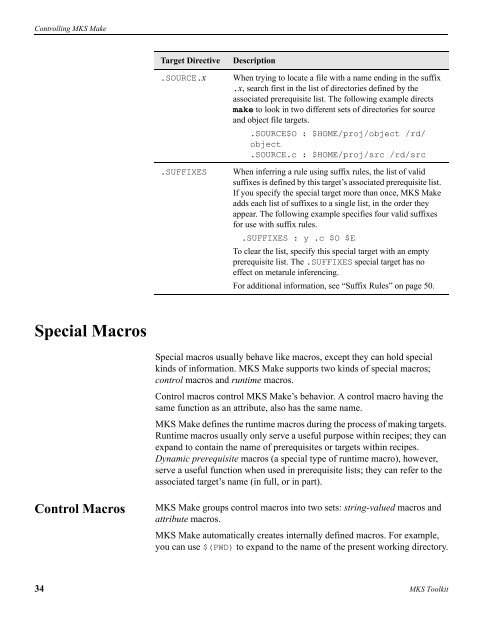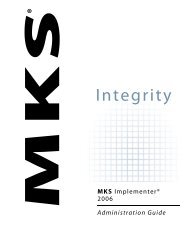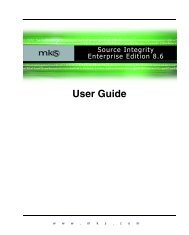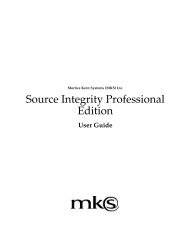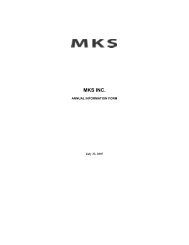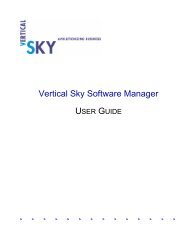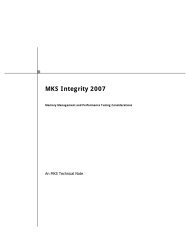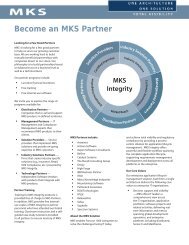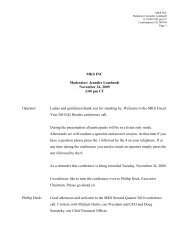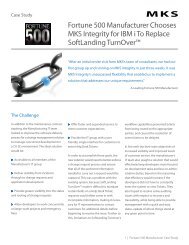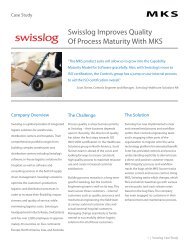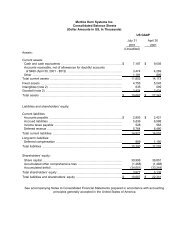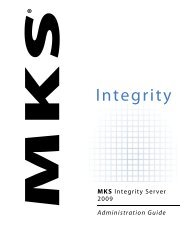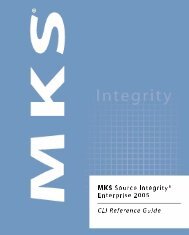Using MKS Make
Using MKS Make
Using MKS Make
Create successful ePaper yourself
Turn your PDF publications into a flip-book with our unique Google optimized e-Paper software.
Controlling <strong>MKS</strong> <strong>Make</strong><br />
Special Macros<br />
Control Macros<br />
Target Directive Description<br />
.SOURCE.x When trying to locate a file with a name ending in the suffix<br />
.x, search first in the list of directories defined by the<br />
associated prerequisite list. The following example directs<br />
make to look in two different sets of directories for source<br />
and object file targets.<br />
.SOURCE$O : $HOME/proj/object /rd/<br />
object<br />
.SOURCE.c : $HOME/proj/src /rd/src<br />
.SUFFIXES When inferring a rule using suffix rules, the list of valid<br />
suffixes is defined by this target’s associated prerequisite list.<br />
If you specify the special target more than once, <strong>MKS</strong> <strong>Make</strong><br />
adds each list of suffixes to a single list, in the order they<br />
appear. The following example specifies four valid suffixes<br />
for use with suffix rules.<br />
.SUFFIXES : y .c $O $E<br />
To clear the list, specify this special target with an empty<br />
prerequisite list. The .SUFFIXES special target has no<br />
effect on metarule inferencing.<br />
For additional information, see “Suffix Rules” on page 50.<br />
Special macros usually behave like macros, except they can hold special<br />
kinds of information. <strong>MKS</strong> <strong>Make</strong> supports two kinds of special macros;<br />
control macros and runtime macros.<br />
Control macros control <strong>MKS</strong> <strong>Make</strong>’s behavior. A control macro having the<br />
same function as an attribute, also has the same name.<br />
<strong>MKS</strong> <strong>Make</strong> defines the runtime macros during the process of making targets.<br />
Runtime macros usually only serve a useful purpose within recipes; they can<br />
expand to contain the name of prerequisites or targets within recipes.<br />
Dynamic prerequisite macros (a special type of runtime macro), however,<br />
serve a useful function when used in prerequisite lists; they can refer to the<br />
associated target’s name (in full, or in part).<br />
<strong>MKS</strong> <strong>Make</strong> groups control macros into two sets: string-valued macros and<br />
attribute macros.<br />
<strong>MKS</strong> <strong>Make</strong> automatically creates internally defined macros. For example,<br />
you can use $(PWD) to expand to the name of the present working directory.<br />
34 <strong>MKS</strong> Toolkit


